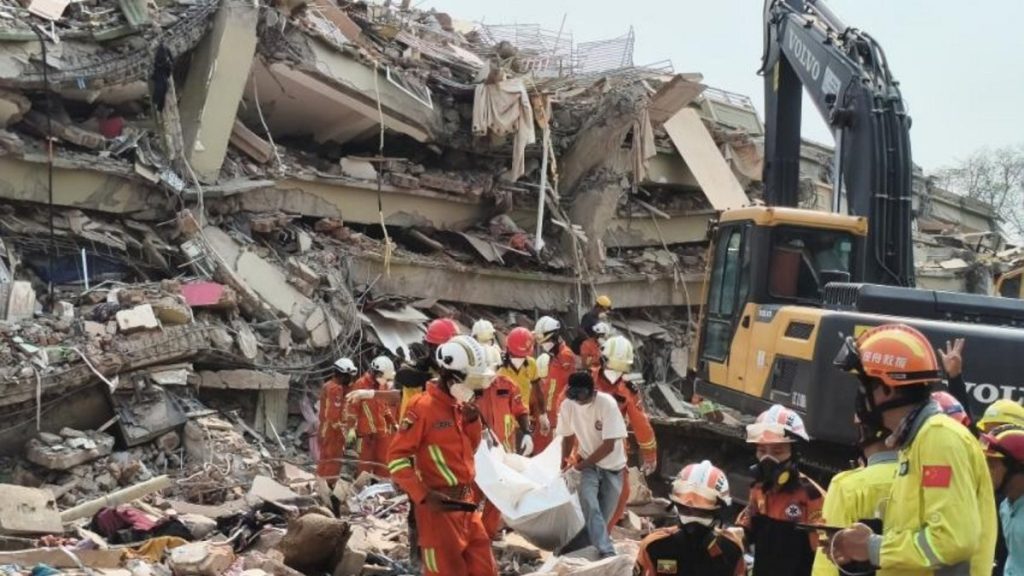Following two devastating earthquakes measuring 7.7 and 6.4 that struck central Myanmar on March 28, Turkish nongovernmental organizations (NGOs) have mobilized to deliver critical search and rescue assistance and humanitarian aid to the affected regions.
The earthquakes, centered near Myanmar’s Sagaing region, were also felt in neighboring countries such as Thailand and China. The destruction was particularly severe in Myanmar, where more than 3,689 people have been confirmed dead and over 5,000 injured. Thailand also reported 36 fatalities as a result of the tremors.
Responding to Myanmar’s call for international assistance, two leading NGOs from Türkiye – GEA Search and Rescue Association and the Humanitarian Relief Foundation (IHH) – quickly dispatched teams to the region.
GEA, with decades of national and international experience in disaster zones, traveled to Myanmar via Bangkok, Thailand, and reached the capital Naypyidaw.
There, the team was assigned to rescue operations at the collapsed Aye Chan Tar Hotel, one of the disaster’s most heavily impacted sites.
GEA team leader Ali Onur Günçel said in a statement to Anadolu Agency that their participation in the rescue operations was coordinated with Türkiye’s Disaster and Emergency Management Authority (AFAD).
He shared that his team managed to rescue two people from the rubble on the fifth and sixth days after the earthquake — survivors whose families had already held funeral ceremonies for them, believing they were dead.
“Around the 121st hour, we rescued two individuals who were thought to be lost. It was truly a miracle,” Günçel said. He noted that despite local officials asking them to halt operations on the third day, assuming no survivors remained under the debris, GEA insisted on continuing and ultimately succeeded, setting a powerful example for international NGOs working in crisis zones.
In addition to search and rescue, GEA also took part in humanitarian efforts, distributing emergency aid and organizing activities for children affected by the disaster. GEA’s Ecology and Humanitarian Aid Coordinator Umut Dinçşahin reflected on the group’s origins, explaining that the initiative began in 1994 as a student-led volunteer movement.
Since then, the team has taken part in over 70 operations worldwide and rescued hundreds of people from disaster zones. He emphasized the strength of GEA’s volunteer-based, professionally trained teams and added that two of their members were serving as referees for France’s civil defense team in a United Nations classification exam at the time the earthquakes struck Myanmar.
The Humanitarian Relief Foundation (IHH), which has been active globally since 1992 in areas such as disaster relief, humanitarian diplomacy, health services and food security, also responded swiftly to the crisis. IHH began providing emergency aid through local partners just one day after the earthquakes, on March 29. A team from Türkiye, led by Mücahit Demir, arrived in Thailand on April 4 and reached Myanmar on April 5 to join the aid efforts on the ground.
Demir stated that IHH’s 15-person team, including local partners, focused on urgent needs such as food and clean drinking water. In the early phase of the mission, they distributed food packages to 810 families in Myanmar and provided hot meals to 4,000 earthquake-affected families in Myanmar and 6,500 people in Thailand. Large water tanks were also deployed in areas where access to clean water had been disrupted.
Demir emphasized that IHH aims to continue its assistance in the medium and long term. Depending on donor support, the organization plans to implement reconstruction projects, including the repair and construction of homes and mosques in Myanmar, to support the long-term recovery of earthquake survivors. He also highlighted the severe humanitarian crisis in the region, where access to basic necessities like food, clean water, hygiene kits, electricity and health care remains extremely limited.
Through their prompt and dedicated response, GEA and IHH have once again demonstrated Türkiye’s deep-rooted commitment to international solidarity, providing not just aid, but also hope to a nation in distress.


